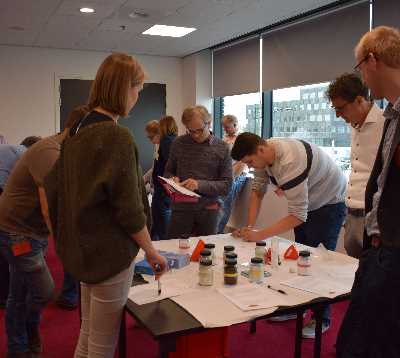Date/Time | |
About
Why the course Powders and Granules:
Physical Properties and Behavior?
The processing of powders and granules, also called bulk solids technology, is of great importance for various branches of industry, such as the chemical, pharmaceutical, coating, food and feed industry. Depending on the sector, the degree of solids involved can vary from 30-80% of the total product flow. In each of these processes the physical properties (such as cohesiveness, particle size distribution, compressibility, density, etc.) of powders and granular material will greatly affect the quality of the product and the flow properties of powders. Especially in the latter case, powders differ greatly from liquids and gases. Powder particles and granules can also experience wear during production, storage and (pneumatic) transport. The forces encountered can be divided into impact forces, compressive forces and abrasive forces. Impact and compressive forces can break powder
particles and granules whereas abrasive forces can cause fines and dust, and this is often an undesired phenomenon.
The processing of powders and granules is still mainly an empirical routine,
although the theoretical and practical knowledge on this subject is increasing
rapidly. Also more and more techniques become available to mimic the behavior in powder processes on a laboratory scale.
This course examines various techniques to characterize and approaches to test bulk powder behavior. The “flow ability” and “flood ability” of bulk powders are essential in powder storage. Bulk crushing strength but also the tensile strength of individual pellets, granules, and tablets are key in physical transport, as well as the wear and tear (attrition, abrasion) that powder particles and granules can experience. As a result of the latter, the tendency to produce dust (dustiness) can be a point of concern as it impacts on product quality and process conditions, but it can also be relevant for health, safety and environment. Not only when mixing but also during subsequent unit operation as conveying, dosing or storage, demixing (segregation) of powder blends can occur and this should be carefully considered.
This course teaches you how to make the connection between powder properties and physical properties (e.g. particle size with powder flow and compaction) on the one hand and the modeled background of these properties on the other. You will learn how powder flow can be determined and how to change powder properties, so that the performance can be adjusted in applications.
For whom?
You are a process engineer, mechanical engineer, food technologist or chemist with a bachelor or academic background and you are working in an industry where solids are processed or manufactured (powders, granules, etc.). Also as operator, analyst, or otherwise interested in these topics, one can greatly benefit from this course.
Content
Program
Solids Technology can be divided into four themes: powder flow and storage, production, handling and physical transport. The course is structured according to these themes, and gives practical meaning to it. A strong link will be made between theory and practice. Below is a list of subjects that will be discussed and questions that will be answered:
- Powder flow and storage: shear stress, wall friction, consolidation of powders, shear testing, hopper design
- Production: formulation, granulation, coating, milling
- Handling: mixing and segregation (also in relation to particle properties); how to manage it and how to measure it
- Solids transport and the strength of particles, also in relation to attrition, formation of dust, etc.
Methodology
The course will be given on the location of Delft Solids Solutions in Wateringen (near Delft), where a well-equipped laboratory is available.
Among various readings there are short demonstrations. Many of the experimental methodologies and techniques discussed can be seen in operation.
Duration
The course consists of two successive days of 8 hours each.
Objectives
End result
After the course you understand the basic concepts of processes and techniques in which powders and granules play a role. You will be able to design or modify a process in such a way that it is optimally adapted to produce products with the desired properties. On the basis of the many examples, you develop a comprehensive understanding of how powder and granulate properties can be decisive for the final application and how to adapt these.
Certificate
Upon completion of the course you’ll receive a certificate of participation.
Other info
Location and dates
This course is held at the premises of Delft Solids Solutions, Molenweer 2B, 2291 NR Wateringen, The Netherlands.
The course scheduled for 24 and 25 November 2021 was fully booked. Unfortunately we had to cancel the extra December 2021 edition.
Two new editions were scheduled in early 2022:
16-17 March 2022
31 March – 1 April 2022
Financial investment
The investment in this 2-day course amounts to € 1.495,- ex. VAT.
Contact
For more information on this course, you can reach us at +31 174 271 460.
Or send an email to info@solids-solutions.com
Subscribe
Subscription can be done via the link below that opens on a new web page.
PLEASE NOTE THAT THE EDITION SCHEDULED ON THE ORIGINAL DATES OF 24-25 NOVEMBER 2021 IS FULLY BOOKED.
THE SECOND EDITION OF THE COURSE SCHEDULED ON 22-23 DECEMBER 2021 WAS POSTPONED DUE TO COVID-19 RESTRICTIONS
WE THEREFORE SCHEDULED 2 EXTRA EDITIONS – THESE DATES ARE:
16-17 MARCH 2022
and
31 MARCH – 1 APRIL 2022
If you subscribe via the form indicated below, we can include you in one of the two editions.
Brochure
Click here to download the brochure in pdf.




